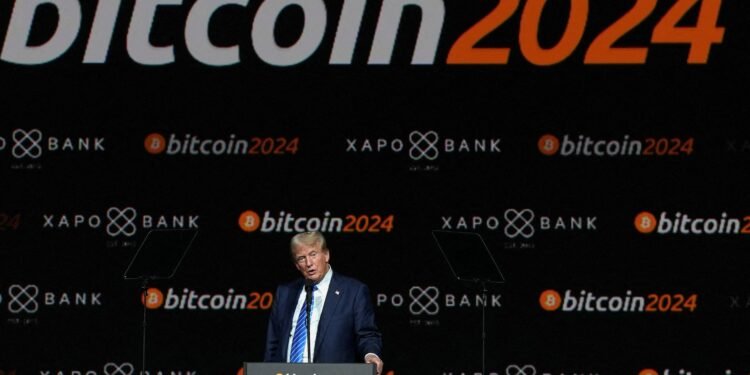Headline: The Impact of Trump’s Proposition for a U.S. Bitcoin Reserve: Effects on the Economic Landscape and Taxpayers
Opening Impressions:
The year is 2023, and the surge in Bitcoin prices is attributed to President-elect Donald Trump’s vision of fostering a cryptocurrency-friendly administration. Central to Trump’s strategy is the establishment of a national Bitcoin reserve, part of a wider initiative aimed at positioning the United States as a frontrunner in the global digital currency domain.
Insights from Experts:
During a conference held in July, Trump advocated for building and safeguarding the nation’s Bitcoin assets as an enduring national resource to benefit all citizens. Criticizing the government’s historic approach towards Bitcoin, Trump stressed the importance of accumulating a core reserve instead of dispelling holdings. Seoyoung Kim, a finance associate professor at Santa Clara University and the author of “DeFi For Dummies,” suggests that holding back on sales could lead to a more stable Bitcoin market, advantageous for current stakeholders.
Context within the Market:
The United States currently possesses almost $20 billion in Bitcoin from legal confiscations. While federal authorities occasionally sell portions of these assets, Trump proposes halting further sales to nurture a stronger Bitcoin market. Republican Senator Cynthia Lummis has introduced a bill suggesting the procurement of 1 million Bitcoins—about 5% of the available tokens—funded by reassessing $11 billion worth of government-held gold certificates.
This initiative aims to make a dent in the nation’s massive $36 trillion national debt while potentially shoring up the U.S. dollar. Lummis points out in a letter to The Wall Street Journal that despite short-term fluctuations, a strategic Bitcoin reserve could act as a reliable store of value in the long haul.
Analysis of Impacts:
Trump contends that a national Bitcoin reserve would strategically position the U.S. vis-à-vis global rivals like China. Recent data showcases that China holds around $18.5 billion in Bitcoin, with substantial amounts also held by the U.K., Ukraine, Bhutan, and El Salvador. However, experts like Michele Neitz of the University of San Francisco caution against the reserve plan, proposing clearer regulatory structures that foster overall economic stability rather than relying on volatile assets.
Concerns persist around the risks associated with a federal Bitcoin reserve. Owen Lau, a senior analyst at Oppenheimer & Co., casts doubt on the feasibility of financing a strategic reserve, noting that such a strategy necessitates Congressional sanction—an improbable outcome given the current political climate. Lau highlights worries regarding the security of cryptocurrency wallets and potential taxpayer losses in case of a steep decline in Bitcoin’s value, mirroring the market’s historical volatility.
A Barclays report underlines that establishing a Bitcoin reserve might require fresh Treasury debt issuance, which is likely to face opposition from the Federal Reserve. Fed Chair Jerome Powell reiterated the central bank’s policy in a recent media briefing, stating that the Federal Reserve is not permitted to hold Bitcoin and any deliberation on such matters falls under Congressional jurisdiction.
Wrapping Up:
As the concept of a U.S. Bitcoin stockpile gains traction, the ramifications for American taxpayers and the economy at large are intricate. While Trump’s proposition could bolster the country’s reputation in the cryptocurrency sphere, experts stress the importance of careful assessment and a focus on regulatory clarity. Skillful management of cryptocurrency could be a two-edged sword, bearing both risks and benefits that necessitate thorough contemplation as the landscape evolves.








